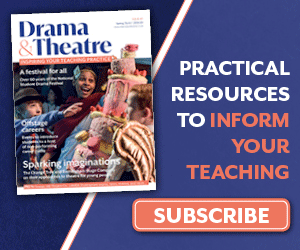
The recent White Paper from the government includes some interesting policy changes some of which have implications for National Drama. Some of the decisions offer a ‘little hope’ that National Drama will be a more influential force in providing teachers and schools with much-needed guidance and accessible and relevant resources.
The White Paper proposes a new ‘arms-length curriculum body’ that will work with teachers across the country to co-create free, optional, adaptable, digital curriculum resources that will help them to deliver a rigorous, high-quality curriculum. Our potential inclusion in this development relates to ND’s significant contribution to the Oak National Academy, which was established during lockdown. Our delivery of Drama and theatre lessons for secondary and primary has been highly valued and we have no reason to doubt that our advice on future digital resources will be sought. However, the bidding process will begin in the autumn. If we are successful in our bid, we will ensure that the drama and theatre digital resources are relevant, curriculum-focussed and supportive of Drama teachers.
ND’s involvement in the Oak National Academy has, for the first time, ensured that government has recognised Drama as a subject in its own right
Perhaps it is also significant that the Education Secretary, Nadhim Zahawi, appears to be valuing the role of subject experts, and National Subject Associations, as his source of advice, comment and collaboration in this matter:
Each subject will have a choice of resources, providing variety for teachers. This sector-led approach will draw on expertise and inputs from across the country, involving teachers, schools, trusts, subject associations, national centres of excellence and educational publishers.
This is to be welcomed. For too long a generic and reductive analysis of curriculum procedures, knowledge and skills has resulted in Drama being forced to adopt inappropriate teaching procedures and assessment methodology. National Drama will seek consultative meetings to ensure ministers understand the uniqueness of our subject that ‘difference’ between subjects should be seen as a positive thing.
ND advocates that Drama is a subject and should have the same curriculum status as the other arts. However, in common with other arts, it should also be celebrated for its distinctive curriculum identity.
The White Paper does communicate contradictory messages. There are some positive comments relating to improvements and progress based upon shared knowledge, collaboration and partnerships. It also proposes new opportunities for professional development. However, when it describes the criteria to measure these policies, it relies on the familiar, functional and inappropriate rhetoric of previous government pronouncements.
There is also the promise of a cultural education plan, but the indications are that there will be little authentic ‘space’ or genuine support for Drama and theatre. The key ‘tell-tale’ phrases are underlined below:
As part of a richer school week, all children should be entitled to take part in sport, music and cultural opportunities. These opportunities are an essential part of a broad and ambitious curriculum, and support children’s health, wellbeing and wider development, particularly as we recover from the pandemic. The government will publish updated plans to support sport and music education in 2022, and will publish a cultural education plan in 2023, working with the Department for Digital, Culture, Media and Sport and Arts Council England. This will include how best to support young people who wish to pursue careers in our creative and cultural industries.
ND will write to the School’s Minister to offer our advice in the formulation of the cultural education policy.
In conclusion, the proposal to form a new Institute of Teaching is to be welcomed, if it is envisaged to be a forum for rigorous debate in respect of learning matters. The new institute will provide a further focus for ND advocacy and we will do our utmost to play a role in ensuring Drama is represented.
The White Paper communicates a lot of pledges, some awareness of quality process, and some recognition of the need for collaboration across the sector but, as with previous policy documents, there is a strong emphasis on numeracy and literacy as a way of measuring progress. More detail of ‘how’ these pledges are to be achieved is required.
Dr Geoff Readman
Chair, National Drama




